|
Environmentalists are running scared these days. They fear
that President Bush will cash in on the political capital
that he earned from his Administration's masterful handling
of the so-called "War on Terror."
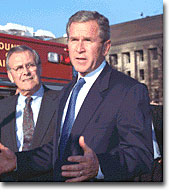 Ridin' high
Ridin' high |
Enjoying a 90 percent popularity rating, Bush may try to
roll back environmental regulations and push for the "dig
and drill" energy policy developed by Vice President
Dick Cheney and "retired" Enron CEO Ken Lay. [Bush
apparently is no longer tight with his former bud, "Kenny
Boy." That's since the President found out that his mother-in-law
lost more than $8,000 on her investment in Enron.]
Environmentalists long for the pre-Sept. 11 days when many
of Bush's energy proposals were expected to be trashed and
rightfully called paybacks to the energy companies that bankrolled
the President's campaign. Now they are not so smug.
National
security = ANWR oil?
The Administration is pegging a national security theme to
its resource development theme. Drilling in the Arctic National
Wildlife Refuge is being pitched as a way to reduce U.S. dependence
on oil from the Middle East.
It doesn't matter that ANWR would only supply a mere drop
in the bucket of this country's energy needs.
The U.S. Geological Survey says the Arctic Refuge holds only
3.2 billion barrels of economically recoverable oil - less
than what the nation uses in six months.
When spread over the 50 years of the field's lifetime, it
is estimated that ANWR would contribute less than one percent
of the oil the U.S. is projected to consume in that time.
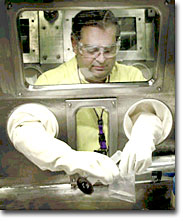
Abraham says every drop
of ANWR oil counts. |
So what, replies Energy Secretary Spencer Abraham. He wrote
an op-ed piece in The Wall Street Journal that said
ANWR drilling can hold secure the country's energy future.
"The House knows - and the Senate would agree if allowed
to vote on it - that ANWR would reinforce energy security
by increasing domestic oil production," he wrote.
"Just consider: The mid-range estimates for reserves
in ANWR are the equivalent of 10 years of oil from the Persian
Gulf.
"That's 10 years to let diplomacy work in the event
of a serious disruption in supply. That's not a bad investment,"
wrote the former Michigan Senator.
Brook Simmons of the office of Sen. Don Nichols (R-Okla.)
set us straight on the need to drill in ANWR.
"The U.S. gets most of its oil from overseas and that
puts America at a great security risk," said Simmons,
Communications Director for Nichols. "We need to think
about correcting that problem, and ANWR is one way to do that.
Opening that small amount of land to drilling and exploration
is vitally important to securing America's future," added
Simmons.
Deborah Louison, APCO Worldwide's senior VP/director of global
services, seconded the need to drill. "I think 9/11 has
underlined the need to look at energy sources other than the
Middle East," Louison told this website. "Bush is
more likely to be supportive of an increase in the exploration
and development of domestic energy sources.
If it's explained to the public that there's an absolute
need for further development of our own oil resources, they
should be more supportive of a new energy plan," said
Louison, a former Energy Dept. staffer in the first Bush Administration.
Unreliable
Saudis
Can America count on Saudi Arabia to pump out as much oil
as the it needs to power its fleet of SUVs? How can the U.S.
count Saudi Arabia as a reliable supplier when 15 of the 19
Sept. 11 hijackers were from the Kingdom?
Saudi Arabia also bankrolls fundamentalist Islamic "schools"
through the world that spew out hatred of all things Western
and mainly American.
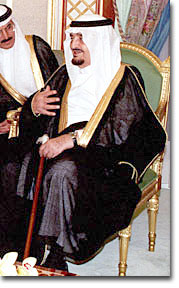 Time is running out
Time is running out
for the royals |
That risk will only grow when America decides "enough
is enough" and pulls out its 5,000 troops that are stationed
there.
What other purpose do those troops have other than to protect
the royal family and the cash it earns from oil? The Saudis
refuse to let the U.S. use American forces or facilities as
a staging area against any Muslim nation–other than Iraq.
That's because Saddam Hussein is the tough guy in the neighborhood
who could send the Saudi family packing to live in luxurious
exile in London, Paris or Rome.
So when the U.S. pulls out, it's bye-bye royals, hello to
a Taliban-like government that is not likely to play footsie
with the multinational oil crowd.
The White House plans to score big with the national security
argument about the need to reduce exposure to the unstable
Middle East.
Russia may be a good energy partner now, but there is no
guarantee that its future governments will be eager to supply
the West with oil.
So Bush's dig and drill pitch may strike a cord. But it shouldn't,
if environmentalists can get their act together on pushing
the conservation argument.
Get conservation
message out
Greens should sing about the merits of conservation loud
and clear.
The Sierra Club is among leading groups to refute the point
that drilling and digging are in America's national security
interest. The organization ran an ad earlier this month that
called for a 21st Century national energy policy designed
to make the country more secure while protecting the environment.
Conservation is key to that approach. As Sierra Club executive
VP Carl Pope likes to point out, "Americans can save
billions of dollars at the gas pump and conserve more oil
than we import from the Persian Gulf" by applying technology
to increase fuel mile standards on cars and trucks.
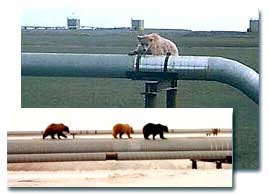 Happy now,
Happy now,
but pollution danger lurks |
The Sierra Club says that increasing auto fuel economy standards
to an average 40 miles per gallon would "cut global warming
pollution by 600 million tons, save consumers $45 billion
in gas and save one billion barrels a year."
The Natural Resources Defense Council is singing that same
tune. It notes that the U.S. imports half of its oil needs,
and that an increase in domestic drilling isn't going to remedy
that situation.
"Sixty-five percent of the world's known reserves lie
beneath the Persian Gulf. If we do not act, the share of our
oil that is imported will grow from one-half to nearly two-thirds
by 2020," notes a report by the NRDC and the Union of
Concerned Scientists. "Middle East instability makes
for a situation that could change at any moment."
The report notes that drilling the ANWR would increase world
reserves by one-third of one percent. "That makes an
energy strategy based only on drilling for new oil at home
into a recipe for continued dependence on unstable regions."
The NRDC and UCC propose a mix of increased fuel standards,
mass production of hybrid gasoline-electric cars (like those
made by Toyota and Honda), hydrogen-powered fuel cell cars,
and more production from renewable energy sources as the way
to cut this country's "dangerous addiction" to oil.
Massachusetts Senator John Kerry introduced his own "energy
security" plan on Jan. 22 as an alternative to Cheney/Lay's
dig and drill plan.
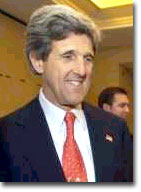
Sen. Kerry raps
Cheney-Lay energy
plan as old-fashioned thinking. |
The Democrat said of Cheney/Lay: "Old thinking passed
through the doors of 1600 Pennsylvania far more often and
easily than new thinking. Exxon Mobil, Enron or Chevron enjoyed
an access bonanza at the expense of consumers and state-of-the-art
environmental technology manufacturers."
As a result, "those most heavily invested in the current
energy system have set a course for the future which, not
surprisingly, champions status quo policies at the expense
of new ideas and innovation.
"What's worse, President Bush's claims that prolonging
the status quo will somehow ensure ‘energy independence'
for America, and his party's leaders happily echo his cry–as
if by embracing their lack of vision we'd all be able to sit
back, relax, and put our fleet of international oil tankers
in drydock," said Kerry.
He proposes conservation and the use of new technologies
to save energy and improve efficiencies.
Environmentalists and Kerry must keep the heat on Bush.
Popularity is fickle. Bush Senior enjoyed high marks following
the Gulf War, and wound up getting clobbered by Bill Clinton
when the economy tanked.
Dubya's popularity will sink like a rock in the event that
Osama bin Laden resurfaces and taunts the U.S.
Bush's worst nightmare is to be ridiculed by Osama just like
dad was tortured by Saddam after he prematurely declared victory
in the Persian Gulf war and let Hussein continue his development
of biological, chemical and nuclear weapons that may be used
to get even with the U.S.
Conservation and better energy efficiencies are the best
ways to cut dependence on foreign oil.
|
